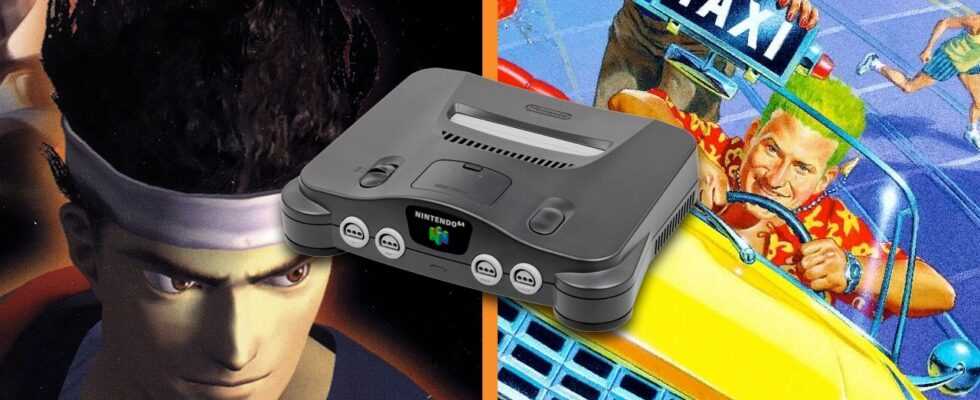21 years later, 2001 continues to bring back bad memories for longtime SEGA fans. It was in fact at the end of January 2001 that SEGA announced the cessation of production of the Dreamcast as well as its intention to concentrate on publishing games for competing machines. Obviously, this type of change did not happen overnight. And according to new revelations, some within the house of Sonic wanted to stop the expenses well before the official announcement.
SEGA games like Virtua Fighter 3 and Crazy Taxi could have been ported to Nintendo 64. This revelation, as surprising as it is improbable, comes from the NintendoLife site. The latter has indeed received the information from James Mielke, a former journalist now producer at Limited Run Games. According to him, Bernie Stolar has reached an agreement with the CEO of Acclaim to port a selection of SEGA games to other consoles.
For the record, Bernie Stolar was President of SEGA of America between 1996 and the end of 1999. And obviously he quickly felt that SEGA’s days as a console maker were numbered. James Mielke explains how he discovered the thing at the time:
I was in charge of the previews section at Gamespot in San Francisco and had a reliable source at Acclaim. One day at the start of the Dreamcast era, my source told me behind the scenes of a crazy day he had spent in the office. A day during which everything degenerated because Bernie Stolar concluded an agreement with Greg Fischbach (co-founder and CEO of Acclaim, editor’s note) concerning the port of Virtua Fighter 3 and Crazy Taxi on Nintendo 64. It sounded completely bonkers technically speaking as this platform would have been unable to produce anything resembling the level of quality seen on Model 3.
SEGA Japan’s opinion: no way Jose
Some of the Dreamcast games were ports of Arcade games running under Model 3. Among these games was, for example, Virtua Fighter 3. Crazy Taxi was running on Naomi in Arcade, a system even more advanced than Model 3. Serious compromises would have been made. therefore were necessary to offer these games on Nintendo 64.
As everyone knows, neither Virtua Fighter 3 nor Crazy Taxi were released on Nintendo 64. And it was not until 2001 that SEGA games were released on consoles from other manufacturers. Why did things not happen? Quite simply because Bernie Stolar signed this agreement behind the backs of his Japanese superiors. And as it is possible to imagine, the thing did not go well:
The craziest thing in all of this is that to my knowledge, Bernie simply made this agreement with Greg Fischbach without obtaining the agreement of SEGA Japan. A contract has been signed, etc. From what I remember this story, SEGA got wind of it and naturally said “no way we do that. “ I don’t remember if this rejection came from management or from the developers who said “it is not even possible. ” But in short, they informed Stolar that he was going to have to break the contract because there was no way things would get done. One of his colleagues at SEGA of America, who worked two floors above us in San Francisco, also confirmed this story to me. (Gamespot and SEGA of America were both based in San Francisco at the time, note).
No SEGA games for Nintendo 64
The intention of SEGA of America and Acclaim to release Crazy Taxi and Virtua Fighter 3 on Nintendo 64 could have caused a lot of noise at the time. However, the information was never released as is on Gamespot. James Mielke explains that his boss at the time wanted him to tell her about his source at Acclaim. What the journalist refused to do as good journalistic practice requires.
The breach of the contract signed by SEGA of America and Acclaim obviously had consequences. The latter are however not known. But it is possible to assume that Acclaim obtained the publishing rights to several SEGA games in compensation. F355 Challenge was for example published on Dreamcast then on PS2 by Acclaim. Crazy Taxi has also been ported and edited on PS2 and GameCube by the same Acclaim. And there are just two examples of SEGA games published by the American publisher.
That being said, there is nothing to categorically state that these porting and publishing agreements are linked to the Nintendo 64 affair. At the time of writing, neither Bernie Stolar nor Greg Fischbach have commented on this story. It remains to be seen whether they will.
What do you think of this revelation? Would you have believed the information if it had been released at the time? Do you think the Nintendo 64 could have run satisfactory versions of Crazy Taxi and Virtua Fighter 3? Give us your opinion in the comments below.
